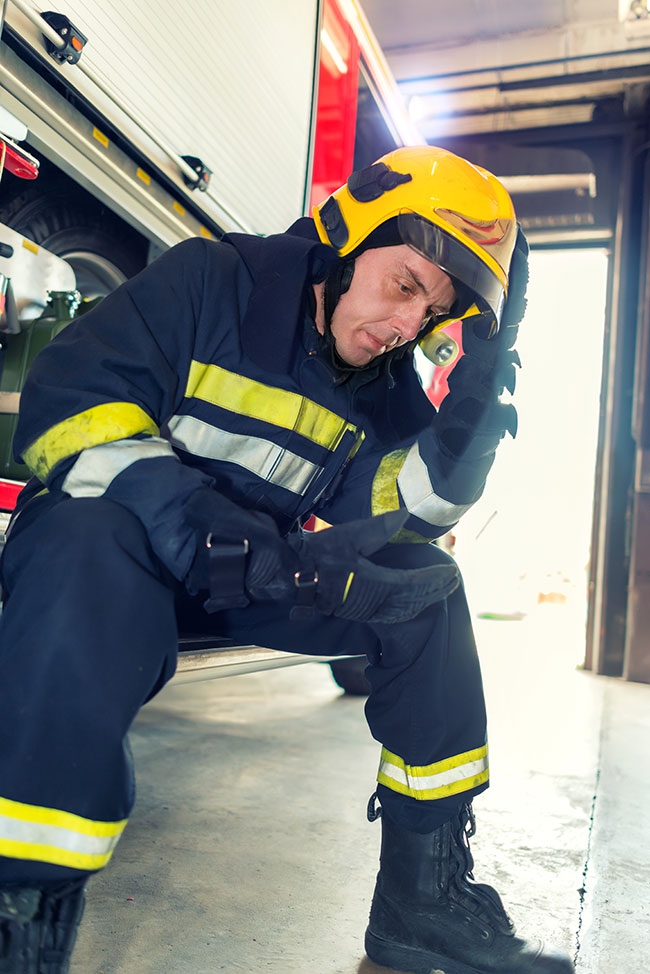
Features
Health and wellness
Hot topics
Stress management | March 2017
Not all critical incident stress management (CISM) programs are equal. Having had the privilege to work on four CISM teams, it is clear that certain practices and protocols enhance the program for both facilitators and participants. If your department is looking to adopt a CISM program, here are some considerations.
February 21, 2017
By David Moseley
 Ensuring that CISM facilitators receive annual refresher courses to help develop their skills is an important consideration when choosing a program. Not all critical incident stress management (CISM) programs are equal. As David Moseley writes in the March issue of Fire Fighting in Canada
Ensuring that CISM facilitators receive annual refresher courses to help develop their skills is an important consideration when choosing a program. Not all critical incident stress management (CISM) programs are equal. As David Moseley writes in the March issue of Fire Fighting in Canada■ Training
Most CISM programs are based on two-day crisis intervention courses affiliated with the International Critical Incident Stress Foundation. Some programs offer annual one-day refresher courses, during which facilitators hone and improve their skills through role play; this improves delivery and instills confidence, which is reassuring to those who receive the service.
All department members, not just peer supporters, should be trained in CISM awareness. Awareness training ensures that everyone can describe critical incident stress and knows that CISM procedures are in place. Essentially, awareness training is a defusing or debriefing but minus the exploration stage of CISM, since it is generic and proactive. Done effectively, awareness training can speed up and smooth out subsequent defusings and debriefings. If the introduction and information are already familiar to firefighters, effort and time is freed up to focus on the exploration stage of the CISM process.
Once firefighters are familiar with critical incident stress, they can recognize symptoms and regularly use the coping skills. Officers with awareness training will be better prepared to recognize when CISM may be needed, and all department members will be more likely to accept a resource which with they are familiar. Awareness level information can also be provided to municipal officials, elected representatives and firefighters’ families, since it is not incident specific. What may be perceived as a lack of support by council or spouses for those experiencing critical incident stress may stem simply from a lack of understanding.
■ Mentoring
Mentoring support is also important, and fortunately CISM delivery lends itself well to mentoring. Normally, there is more than one CISM facilitator in a session – often a newer instructor and a mentor. For the newer instructor to gain confidence, it’s a good idea to let that person lead the session and have the mentor fill in an gaps at the end of each segment; this system – rather than having both facilitators present portions of the program – allows the newer instructor to relax without worrying he or she will miss something important.
■ Communication
Building team cohesion is equally critical to ensure that CISM leaders are aware of changes and developments. Because some CISM groups are spread over large geographical areas, members may not know each other, and call outs for CISM support may be infrequent; a newsletter is an effective way to communicate updates and training tips.
■ Skills
The most important component of a CISM group are the people. Certain technical skills and character traits are required to be an effective peer supporter. Much of the refresher training focuses on improving active listening skills, which are already used by fire supervisors, instructors, and investigators. Peer supporters must be respected and trusted by their colleagues and known for empathy and caring. Nothing shuts down a defusing or debriefing faster than a lack of sincerity.
■ Participation
Good CISM happens when responses are initiated. Eliciting responses takes some skill and training. Simply asking a firefighter if he or she is OK is the first step, but when it is clear that an incident has had an impact on the crew, a defusing should be scheduled and offices must be aware of next steps. Participation is always optional, but if an officer regularly initiates responses for crews, instead of doing so only on request, firefighters will be more comfortable talking about their reactions to calls and will overcome any perceived stigma, or fear they’re being needy, and will be more likely to participate in defusings.
■ Referrals
While there is more to CISM than defusings and debriefings, it is rare for other components to be utilized by peers, rather it is common practice that professional help be made available to firefighters who need it, generally through employee and family assistance programs. In the absence of EAPs, firefighters should be directed to provincial mental health helplines, or family doctors.
■ Team buy-in
The final key component to successful CISM group is buy-in from management and members. With more awareness of the importance of good mental health, the incidence of post-traumatic stress and first-responder suicides, and direction from provincial or municipal governments to institute mental-wellness programs, there is likely to be little resistance. However, member buy-in will be affected by the quality of the program provided. Nothing succeeds like success, word of a poor CISM program will spread quickly.
An ideal CISM program provides annual refresher training, sends a quarterly newsletter, is regularly utilized, is backed up by an EAP, communicates its existence and process to all members of the organization, and has members attend and present at CISM workshops. A good CISM program is something all firefighters deserve.
***
Part 1 in this series appeared in the February issue of Fire Fighting in Canada and is available online at www.firefightingincanada.com click hot topics/health and wellness.
David Moseley is a forest officer with Alberta Agriculture and Forestry, and lead training officer with Lac La Biche County Fire Rescue in Alberta, focused on operations; other areas of interest include instructing, CISM, and wildfire investigation. Contact him at david.moseley@gov.ab.ca
Print this page